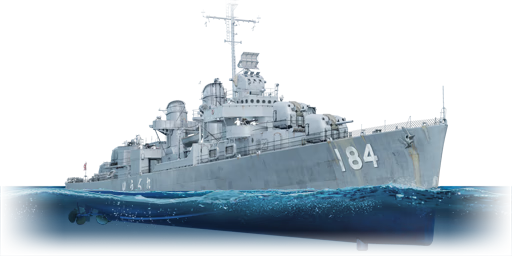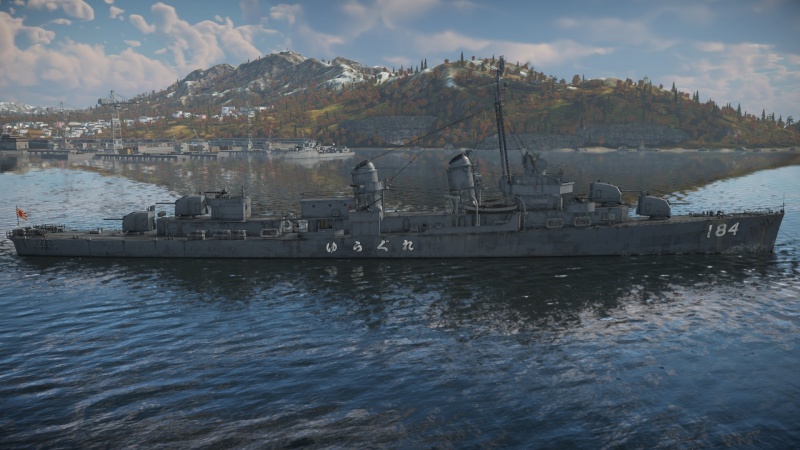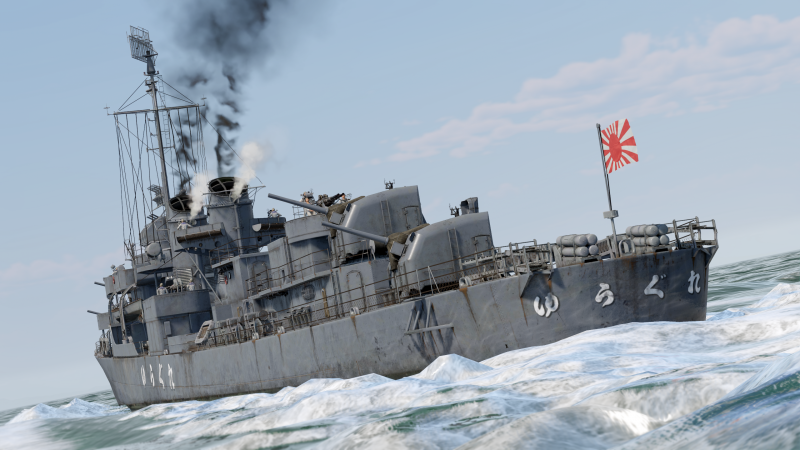Difference between revisions of "JDS Yūgure (DD-184)"
(→Primary armament) |
m (→Description) |
||
| Line 7: | Line 7: | ||
== Description == | == Description == | ||
<!-- ''In the first part of the description, cover the history of the ship's creation and military application. In the second part, tell the reader about using this ship in the game. Add a screenshot: if a beginner player has a hard time remembering vehicles by name, a picture will help them identify the ship in question.'' --> | <!-- ''In the first part of the description, cover the history of the ship's creation and military application. In the second part, tell the reader about using this ship in the game. Add a screenshot: if a beginner player has a hard time remembering vehicles by name, a picture will help them identify the ship in question.'' --> | ||
| − | The ''' | + | The '''Ariake-class, JDS Yūgure (DD-184), 1960''' (ゆうぐれ, [[Abbreviations#.28JP.29_Naval|namesake]]: Twilight), formerly '''USS Richard P. Leary (DD-664)''', was a [[Fletcher (Family)|Fletcher-class]] destroyer of the US Navy. She was loaned to Japan in 1959 along with a sister ship (''JDS Ariake (DD-183)'', formerly ''USS Heywood L. Edwards (DD-663)''), and underwent modifications to serve as a training and experimental vessel. The Yūgure participated in mine warfare until 1974, when she was decommissioned and returned to the US Navy. She was scrapped in 1976 together with her sister. |
| + | |||
| + | It was introduced during [[Update "Ixwa Strike"]] as a reward for the [[wt:en/news/7107-event-future-technology-en|Future Technology]] event. Yūgure is a stripped-down [[Fletcher (DD-445)]] that sacrifices one 5-inch gun, torpedoes, and 20 mm cannons for additional 40 mm twin mounts. This reduces its battle rating and allows it to face less powerful opponents more often. The remaining 5-inch guns have a high fire rate and damage output that can destroy older destroyers easily, and the 40 mm cannons can deal with small patrol boats effectively. | ||
== General info == | == General info == | ||
Revision as of 23:34, 5 September 2023
Contents
Description
The Ariake-class, JDS Yūgure (DD-184), 1960 (ゆうぐれ, namesake: Twilight), formerly USS Richard P. Leary (DD-664), was a Fletcher-class destroyer of the US Navy. She was loaned to Japan in 1959 along with a sister ship (JDS Ariake (DD-183), formerly USS Heywood L. Edwards (DD-663)), and underwent modifications to serve as a training and experimental vessel. The Yūgure participated in mine warfare until 1974, when she was decommissioned and returned to the US Navy. She was scrapped in 1976 together with her sister.
It was introduced during Update "Ixwa Strike" as a reward for the Future Technology event. Yūgure is a stripped-down Fletcher (DD-445) that sacrifices one 5-inch gun, torpedoes, and 20 mm cannons for additional 40 mm twin mounts. This reduces its battle rating and allows it to face less powerful opponents more often. The remaining 5-inch guns have a high fire rate and damage output that can destroy older destroyers easily, and the 40 mm cannons can deal with small patrol boats effectively.
General info
Survivability and armour
Talk about the vehicle's armour. Note the most well-defended and most vulnerable zones, e.g. the ammo magazine. Evaluate the composition of components and assemblies responsible for movement and manoeuvrability. Evaluate the survivability of the primary and secondary armaments separately. Don't forget to mention the size of the crew, which plays an important role in fleet mechanics. Save tips on preserving survivability for the "Usage in battles" section. If necessary, use a graphical template to show the most well-protected or most vulnerable points in the armour.
Mobility
Write about the ship's mobility. Evaluate its power and manoeuvrability, rudder rerouting speed, stopping speed at full tilt, with its maximum forward and reverse speed.
| Mobility Characteristics | |||
|---|---|---|---|
| Game Mode | Upgrade Status | Maximum Speed (km/h) | |
| Forward | Reverse | ||
| AB | |||
| Upgraded | |||
| RB/SB | |||
| Upgraded | |||
Modifications and economy
Armament
Primary armament
Provide information about the characteristics of the primary armament. Evaluate their efficacy in battle based on their reload speed, ballistics and the capacity of their shells. Add a link to the main article about the weapon: {{main|Weapon name (calibre)}}. Broadly describe the ammunition available for the primary armament, and provide recommendations on how to use it and which ammunition to choose.
| Penetration statistics | |||||||
|---|---|---|---|---|---|---|---|
| Ammunition | Type of warhead |
Penetration @ 0° Angle of Attack (mm) | |||||
| 1,000 m | 2,500 m | 5,000 m | 7,500 m | 10,000 m | 15,000 m | ||
| AAC Mk.34 | HE | 36 | 36 | 36 | 36 | 36 | 36 |
| Common Mk.32 | Common | 124 | 103 | 77 | 58 | 46 | 37 |
| SP Common Mk.46 | SP Common | 150 | 125 | 93 | 71 | 56 | 45 |
| AAVT Mk.31 | HE-VT | 36 | 36 | 36 | 36 | 36 | 36 |
| Shell details | ||||||||||||
|---|---|---|---|---|---|---|---|---|---|---|---|---|
| Ammunition | Type of warhead |
Velocity (m/s) |
Projectile mass (kg) |
Fuse delay (s) |
Fuse sensitivity (mm) |
Explosive mass (TNT equivalent) (g) |
Ricochet | |||||
| 0% | 50% | 100% | ||||||||||
| AAC Mk.34 | HE | 792 | 25 | 0 | 0.1 | 3,220 | 79° | 80° | 81° | |||
| Common Mk.32 | Common | 792 | 24.49 | 0.01 | 6 | 1,150 | 47° | 60° | 65° | |||
| SP Common Mk.46 | SP Common | 792 | 25 | 0.01 | 6 | 906.5 | 48° | 63° | 71° | |||
| Proximity-fused shell details | ||||||||||||
|---|---|---|---|---|---|---|---|---|---|---|---|---|
| Ammunition | Type of warhead |
Velocity (m/s) |
Projectile mass (kg) |
Fuse delay (s) |
Fuse sensitivity (mm) |
Arming distance (m) |
Trigger radius (m) |
Explosive mass (TNT equivalent) (g) |
Ricochet | |||
| 0% | 50% | 100% | ||||||||||
| AAVT Mk.31 | HE-VT | 792 | 25 | 0 | 0.1 | 457 | 23 | 3,220 | 79° | 80° | 81° | |
Secondary armament
Some ships are fitted with weapons of various calibres. Secondary armaments are defined as weapons chosen with the control Select secondary weapon. Evaluate the secondary armaments and give advice on how to use them. Describe the ammunition available for the secondary armament. Provide recommendations on how to use them and which ammunition to choose. Remember that any anti-air armament, even heavy calibre weapons, belong in the next section. If there is no secondary armament, remove this section.
Additional armament
Describe the available additional armaments of the ship: depth charges, mines, torpedoes. Talk about their positions, available ammunition and launch features such as dead zones of torpedoes. If there is no additional armament, remove this section.
Usage in battles
Describe the technique of using this ship, the characteristics of her use in a team and tips on strategy. Abstain from writing an entire guide – don't try to provide a single point of view, but give the reader food for thought. Talk about the most dangerous opponents for this vehicle and provide recommendations on fighting them. If necessary, note the specifics of playing with this vehicle in various modes (AB, RB, SB).
Pros and cons
Summarise and briefly evaluate the vehicle in terms of its characteristics and combat effectiveness. Mark its pros and cons in the bulleted list. Try not to use more than 6 points for each of the characteristics. Avoid using categorical definitions such as "bad", "good" and the like - use substitutions with softer forms such as "inadequate" and "effective".
Pros:
- Rapid firing 5-inch dual purpose guns
- High survivability thanks to a large crew size
Cons:
- No torpedoes
History
Devblog
Prior to being loaned to the JMSDF, Yūgure was known as the USS Richard P. Leary (DD-664) and was one of many Fletcher-class destroyers built for the USN during WWII. Commissioned in 1944, the ship took part in some of the last major operations in the Pacific theatre before being decommissioned and put into reserve in 1946.
In 1959, USS Richard P. Leary as well as another Fletcher destroyer were loaned to the JMSDF and was renamed to Yūgure. In Japanese service, the destroyer was modified several times to better fit the anti-submarine warfare and training ship roles. Yūgure would end up serving with the Japanese Navy until 1974 before the ship was returned to the U.S. and ultimately sold for scrap in 1976.
Media
- Skins
See also
- Related development
External links
| Boston Navy Yard | |
|---|---|
| Gun Destroyers (DD) | |
| Fletcher-class | USS Bennion · JDS Yūgure (DD-184)* |
| *USS Richard P. Leary in Japanese service | |
| Japan destroyers | |
|---|---|
| IJN | |
| Momi-class | IJN Momi |
| Mutsuki-class | IJN Mutsuki · IJN Satsuki |
| Fubuki-class | IJN Ayanami |
| Hatsuharu-class | IJN Hatsuharu · IJN Nenohi |
| Shiratsuyu-class | IJN Yuudachi |
| Yugumo-class | IJN Yugumo · IJN Hayanami · IJN Kiyoshimo |
| Shimakaze-class | IJN Shimakaze |
| Akizuki-class | IJN Akizuki · IJN Hatsuzuki |
| JMSDF | |
| Ariake-class* | JDS Yūgure (DD-184) |
| Harukaze-class | JDS Harukaze (DD-101) |
| Murasame-class | JDS Murasame (DD-107) |
| * Modified Fletcher-class destroyers | |
| Japan premium ships | |
|---|---|
| Motor torpedo boats | Type T-14 (mod. 1) · Type T-51a |
| Motor gun boats | Type 4 (Mod 4) · PG 02 |
| Sub-chasers | Type K-8 No.13 |
| Frigates | Akebono |
| Destroyers | IJN Satsuki · IJN Nenohi · IJN Hayanami · IJN Kiyoshimo · IJN Yuudachi · JDS Yūgure (DD-184) |
| Light cruisers | IJN Yubari · IJN Mikuma |
| Heavy cruisers | IJN Myoko |
| Battleships | IJN Yamashiro |






